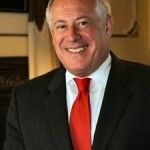Thrust into the November campaign after winning by just 193 votes over his primary opponent, Republican Senator Brady prepares to battle Governor Quinn on platforms he believes will create jobs, lower taxes and demonstrate competent leadership.
If you’re looking for any two politicians who are less similar than Governor Pat Quinn and State Senator Bill Brady you probably won’t find them. The candidates differ on everything from economic policy and fair working conditions to social issues. Quinn favors raising the minimum wage. Brady claims the minimum wage should be determined by supply and demand in the marketplace. Quinn is liberal on social issues. Brady has a history of hard-line pro-life votes and opposes gay rights. Quinn favors equal pay for equal work. Brady believes the marketplace should set pay standards and dictate pay rates for men and women.
- Bill Brady
- Gov. Pat Quinn
While many Republicans believe Quinn’s income tax increases will alienate him from voters, the governor says Brady’s conservative views won’t help him in November.
“My opponent’s extreme conservatism shows he’s out-of-touch with voters,” says Quinn. “Constituents in Illinois are looking for someone who can relate to them.”
In November, Illinois citizens will determine what lies ahead—four more years of Democratic ideology or a nascent Republican governorship.
Cut, cut, cut; tax, tax, tax
When it comes to Illinois’ record setting $13 billion deficit, Quinn and Brady can agree on one thing: the state must exercise fiscal responsibility. Quinn favors a personal income tax increase from 3 to 4 percent. He plans to raise the corporate rate from 4.8 to 5.8 percent. Quinn says the money would generate $2.8 billion dollars a year to help the state pay schools and prevent egregious cuts in education spending.
Brady, who believes tax increases will not only drive businesses from Illinois but also lead employers to cut jobs, advocates decreasing debt by creating revenue. “The key here is we need to balance the budget in the first fiscal year,” Brady says. “The governor has accumulated $6 billion worth of unpaid bills. I would like to decrease our debt by building revenues of at least $2 billion a year to build back the money he has spent. We need to balance the budget and build revenue simultaneously.”
Brady, 48, a businessman and real-estate developer from Bloomington who has served 17 years on the Illinois legislature, claims Quinn and others of his political ilk are placing big government before real change and Democratic dogma before constituent needs. “Quinn wants to keep things the way they are, and the status quo is what’s hurting the people in this state,” says Brady.
But the governor says he has the people’s best interest in mind. Quinn, 61, who was sworn in following the dramatic exit of former Governor Rod Blagojevich, released broad budget outlines several weeks ago along with a statement asking the public for suggestions on how to best decrease the deficit. The outlines propose decreased spending for education, human services, economic development and public safety.
“We’ve lost over $1 billion to pay for the budget within the last year making interest payments on the money we borrowed,” says Quinn. “We’ve engaged in strategic borrowing for education. If we don’t raise income taxes to help pay for education, we’ll see at least 17,000 Illinois teachers laid off.”
Where Are the Jobs?
The state deficit isn’t the only thing that’s left an acerbic taste in the mouths of state voters. Illinois’ unemployment rate hit 11.4 percent last month. Governor Quinn signed into law the Jump Start Capital Plan—a $3 billion statewide construction program designed to put unemployed constituents back to work. The Capital Plan will fix crumbling roads, mass transit and schools and will be paid for by legalizing video poker, raising fees on motorists and raising taxing on candy, beauty products and alcohol.
“This is the first major public works package in a decade,” says Quinn. “It will create thousands of much-needed jobs for the unemployed in this state.”
Brady is calling for a new tax credit to increase employment. “We want to give incentives for businesses to reinvest the money they save into their business. This will create hundreds of jobs,” he says.
The Illinois senator has pledged new tax cuts and credits and the streamlining of state bureaucracy to help Illinois agricultural industries remain competitive. Brady believes agriculture is the most important Illinois industry and therefore needs to be kept at the forefront of the state’s economy. Brady pledged a new 10 percent tax credit of up to $2,100 for businesses that create new jobs in the agricultural sector. He also plans to eliminate the estate tax, which affects farmers desiring to pass their farms onto future generations.
The governor says Brady’s past voting record belies his agenda for helping workers and businesses. “Senator Brady has opposed equal pay for equal work. He’s opposed the Family Medical Leave Act (a bill that provided twelve weeks off to care for an infant child or serous illness of the employee or immediate family) and he’s voted against increasing the minimum wage,” says Quinn. “I think there will be vigorous debate within the next year on these issues.”
Brady denigrated Quinn’s remarks, claiming the key to this election is not conservative but fiscal issues. “As a fiscal conservative, I will work to create jobs, cut government spending and decrease the debt the governor has accumulated,” he says. “You can’t keep exploding government. You can’t keep increasing the burden of government on the backs of families, workers and businesses.”
The state senator believes workers’ compensation reform will help businesses and workers. Reform must include equalizing Illinois’ costs with the costs of other states. In 2005, the General Assembly passed HB 2137, the first major reform of Illinois’ workers’ compensation laws in two decades. The legislation increased benefits for those who were hurt on the job, boosting minimum rates for temporary total disability and permanent partial disability to correspond to the state’s minimum wage. Most of the bill’s provisions took effect in 2006, including an investigation unit housed within the Illinois Department of Financial and Professional Regulation to investigate charges of workers’ compensation fraud. Republicans are now pushing further reforms to help alleviate the economic crisis in Illinois.
“Reforming workers’ compensation will help reduce the cost of doing business in Illinois,” Brady says.
Other Issues
Aside from reforming workers’ compensation, Brady desires to eliminate the State Board of Education, an action Quinn firmly opposes. “It’s not a good idea to eliminate the State Board of Education,” he says. “One way you can tell an idea is not a good idea is that it receives very little public support, as this idea has.”
While Brady believes the State Board of Education exerts a negative bureaucratic influence, Quinn believes the board is a necessity when it comes to coordinating educational efforts within Illinois. “Just this week, our State Board of Education went to Washington, D.C. to propose Illinois for more federal dollars for education through the Race to the Top Program,” says Quinn. “The State Board is very valuable and works on constituents’ behalf to a large degree.”
The Race to the Top Program is a national competition designed to advance school reform. States leading the way in school reform will be eligible to compete for $4.35 billion in competitive grants to support classroom innovation. More than $10 billion in grant money will be available to schools and districts. States that outperform the rest will receive the grants as reward.
Early releases for prisoners have also been a point of contention between the candidates. After two prisoners went on to commit violent offenses following early releases during Quinn’s term, Brady condemned the governor’s action as irresponsible and lacking appropriate leadership.
“You don’t release violent offenders early into society and put people at risk after the judicial system has already determined they need to be behind bars,” Brady says. “I will never release violent offenders early if elected.”
Why Quinn?
Despite a few gaffes during his first term in the statewide spotlight, Quinn claims he is the best candidate for governor. The incumbent says he has spent the past year cleaning up the governor’s office, and his constituents are grateful. After the legerdemain surrounding Rod Blagojevich’s governorship, Illinois citizens were eager to replace him with someone of rectitudinous character.
“I took over the governorship in one of the most difficult times in the state’s history,” Quinn says. “Since that time, I have increased ethics and integrity standards in Illinois.”
Quinn has a history of raising political ethics standards. In 1975, he founded the non-partisan, all-volunteer Coalition for Political Honesty to force passage of tough new ethics laws. The Political Honesty Initiative ended a century-old practice that allowed Illinois legislators to collect their entire two years’ advance pay on their first day in office.
And when the General Assembly passed a 40 percent increase to legislators’ salaries in 1978, Quinn responded with a petition drive to reduce the size of the Illinois legislature, eliminating waste by decreasing the size of the governing body. In 1980, Quinn passed the Cutback Amendment, reducing the Illinois House from 177 to 118 members.
Quinn also spent time as a consumer advocate, creating the Citizens Utility Board (CUB) to advocate for customers against unfair utility rates. More than $10 billion has been saved through CUB efforts by blocking rate hikes and winning consumer refunds.
After a career as State Treasurer in the 1990s and then Lieutenant Governor in 2003, Quinn signed an executive order as governor in 2009 establishing the Illinois Reform Commission, a bipartisan commission formed to encourage fairness, honesty, transparency and accountability to Illinois government.
Why Brady?
Brady says his long history on the Illinois legislature has prepared him for a career as governor by giving him opportunities to demonstrate bipartisanship. “My seventeen years serving Illinois has given me the opportunity to work across the aisle,” he says. “In the years that I’ve been in the Illinois legislature, Republicans have only been in the majority for two years. Every piece of legislation I’ve worked on I’ve passed in a bipartisan fashion.”
An Illinois Senator since 2002, Brady has represented areas of seven Central Illinois counties. He was previously elected to four terms in the House of Representatives. The senator says his years in Springfield have given him the privilege of meeting those in authority. “I have the knowledge required to put the right leaders in place for educational, transportation and economic development throughout Illinois,” he says.
Brady has been a leading voice in the Senate and an advocate for creating a business climate that will attract new jobs to Illinois as well as annual tax revenues. In 1983, Brady brushed aside his plans to attend law school and joined his family’s home construction business, a move that has provided him with a keen understanding of the challenges Illinois families and businesses face in the turbulent economy. Brady has also made efforts to reform the state’s underfunded public pension systems.
As a state legislator, Brady has increased educational accountability, promoted fiscal responsibility and alternative energy and has created a worker-friendly business climate with low taxes. In an effort to combat pay-to-play politics, he was the primary sponsor of a constitutional amendment that would give Illinois citizens the power to recall public officials.
A mainstream conservative who appeals to conservative Democrats and independents, Brady has been a leader in ending the Blagojevich/Rezko trail of corruption. He has focused his efforts on limiting campaign contributions, imposing term limits on legislative leaders and ousting legislative district gerrymandering through a responsible redistricting system.
Brady is currently the ranking Republican on the Senate Insurance Committee and is a member of the Revenue, Pensions and Investments, Energy and Environment committees. He also serves on the General Assembly’s Commission on Government Forecasting and Accountability.
For more information on Senator Bill Brady and Governor Pat Quinn, visit their web sites at http://bradyforillinois.com and www.quinnforillinois.com.


